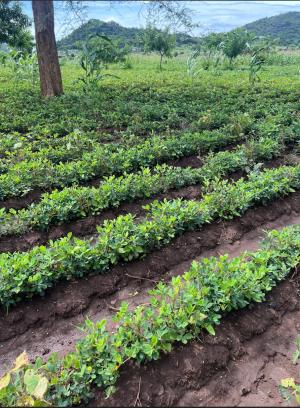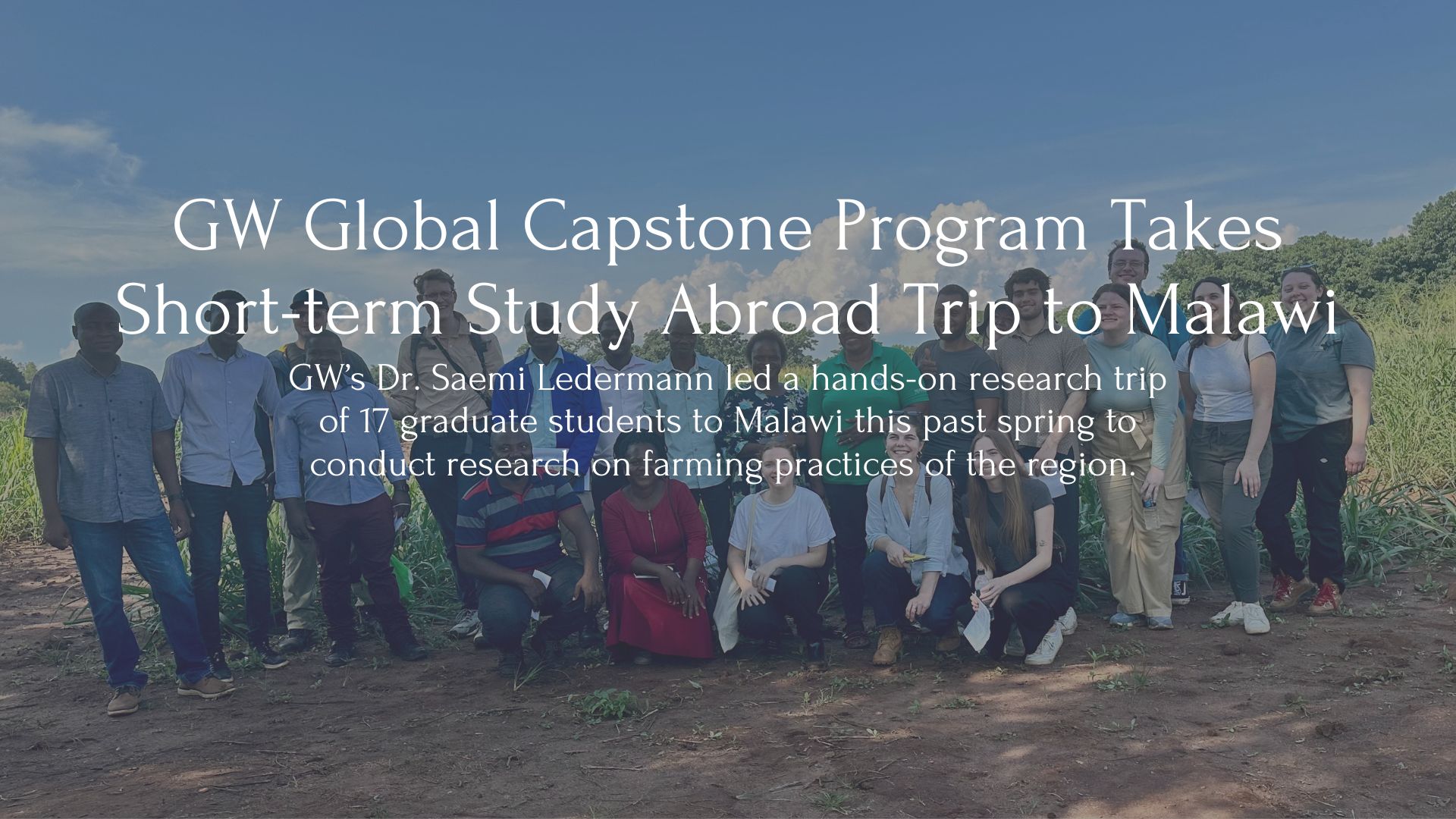GW’s Dr. Saemi Ledermann led a hands-on research trip of 17 graduate students to Malawi this past spring to conduct research on farming practices of the region. In Malawi, the students partnered with Dr. Julius Manda from the International Institute of Tropical Agriculture (IITA), who leads efforts to increase adoption of sustainable agriculture practices among Malawian smallholder farmers. Students conducted interviews and focus groups with smallholder farmers with assistance from translators. The interviews aimed to gain a better understanding of the farmers’ experience using sustainable practices. For many students, it was their first time conducting this sort of field research.

The participants were students in IAFF 6138: Solutions in Sustainable Development: Agriculture and Climate Change in Malawi, a global capstone course offered by GW’s Elliott School of International Affairs. Ledermann, an Assistant Professor of the Practice of International Affairs; Director, Global Capstone; and Interim Director of the International Development Studies (IDS) MA Program in the Elliott School, designed the experiential course to give students field experience that makes them more appealing to future employers.
Students formed groups based on areas of interest and collaborated on designing an interview plan. Students met several times before the trip to get to know each other, learn about the work they would be doing, and prepare research plans. Groups focused on different topics such as food and nutrition security, environment and climate change, gender, and social networks.
An opportunity for transdisciplinary study
Although the majority of students were from the Elliott school’s International Development Masters program, others came from other disciplines, including public health, international education, and public policy.
Olyvia Tremper is in her second year of the International Development Studies Masters program at the Elliott School. Tremper was a member of the Food and Nutrition Security research group and appreciated the different perspectives of her research team members. Their team spoke informally with community members and led formal focus group discussions on the topic of food security. Since this can be a sensitive topic, Tremper and her group built rapport with the community and learned how to make these conversations meaningful. This approach to research was new to many students in the class and provided an extremely valuable learning experience.
Another student participant, Cindy Weinman, graduated with her Masters of Public Health degree in Global Environmental Health in May of 2024 and recently began her work for a PhD in Global Environmental Health at the Milken Institute School of Public Health. Weinman was one of two students from the Global Environmental Health MPH program on the trip. She was a member of the environmental research group with Erin Phillips, who had a background in environmental science, and Rawand Hidmi, who had a background in economics.

Weinman and Phillips are interested in pesticides and the interplay between the environment and our food system. Weinman noted that “Dr. Ledermann was very excited because both of them were interested in the agriculture and soil aspect of the research, which the majority of students are not interested in.”
Weinman was a member of the environmental group who conducted both interviews and focus groups. She believes the environmental group had more opportunities to connect with the people in Malawi than the Food and Nutrition group, since their questions were less invasive. This allowed Weinma
n’s group to make community members feel more comfortable, leading to more productive focus groups and interviews.
One standout interview for Weinman’s group occurred with a 17-year-old in Linthipe who was a climate activist. He was a member of a climate change club that was trying to make a difference in the community and teach people about how the issues were affecting them. This encouraged the group to focus on farmer decision-making and techniques based on the climate, rather than their original plan to focus solely on crop growth.
Highlights from the Trip
The team first stayed in the capital city of Lilongwe. This is where students met with IITA and learned about the sustainable agriculture practices. The students were given a technical background on the science behind this practice and learned how their findings would support IITA’s work. In Lilongwe, the students visited an agricultural research lab where different soil types and seeds were being tested.
After Lilongwe, the team traveled south to the Dedza district, a very rural region of the country. Here they spent 2 days in Linthipe and 3 days in Golomoti. At this point in the trip, each group began the research projects they had designed before the trip. A typical day would begin with a morning discussion, and afterwards the groups would break up to conduct their scheduled interviews and focus groups. Following a day of research, everyone would meet for a dinner and debrief of the day. The team went over what they had learned during the day and what they thought they could change to have the research go more smoothly during the following days. The days were very long, with research occurring from 7 a.m. until 9 p.m.
Student Takeaways and Future Opportunities
Both Tremper and Weinman felt like the trip was successful, and they gained valuable experience from their work interacting with community members. Tremper emphasized the importance of learning from and working with peers. Tremper believes that the trip altered her thoughts on what she wants to do after graduating. By transitioning from desk research and literature reviews into fieldwork, she found that there are many external factors that affect research that she never would have thought of before. They learned this both from their group work with their peers as well as the Malawi community members who rely on each other. In addition to their gained knowledge, they had many fun experiences with peers.
Spring break of 2024 marked the pilot year of the program; however, Ledermann is ready for the second year to begin. Applications for Ledermann’s next trip open September 23rd and close on October 25th. The application process will include written questions that discuss what skills, background, and experience students would bring to the trip. The trip has limited spots with a capacity of just 15 students, all from graduate programs at GW. After a successful first year of the trip, Ledermann is excited to connect with new students and provide the opportunity for students to gain new research fieldwork experiences.
The application and more information can be found at: https://elliott.gwu.edu/short-term-abroad-programs#


